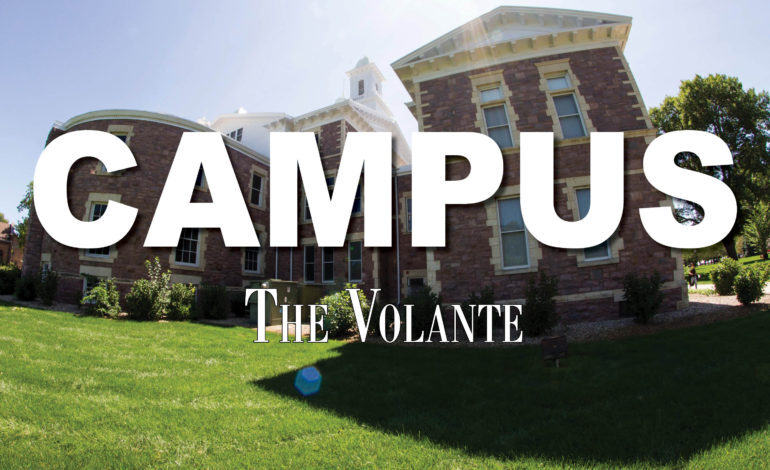
SGA Senate Resolution 7 Speaks Out On Student Federation
USD’s representatives for the South Dakota Student Federation, Ally Feiner and Katie Brust, received an email that the leaders of the federation would be sending representatives from the South Dakota School of Mines and Technology to the South Dakota Board of Regents meeting Oct. 6-7.
This email sparked conversation among Student Government Association Sen. Caleb Weiland and other leaders of SGA, and Weiland decided to take action.
That action came to fruition in the form of SGA Senate Resolution 7, first introduced at the Oct. 5 SGA meeting. The first draft of the resolution took Weiland 20 minutes to write, and he said it came from a spot of passion.
“We received the email approximately four or five o’clock (Tuesday), and we had a meeting about it and I made my opinion very strong that I’m sick of the ineffective behavior of (the) Student Federation, and I think we need to do something about it, so I proposed the no confidence resolution,” Weiland said.
The email said that the Student Federation would be giving an update and would like to be able to address each university. The email also said that the Student Federation has been invited to send delegates on behalf of the Student Federation. The Volante was able to receive a copy of the email sent to the Board of Directors.
“The BOR will be meeting and conversing with the universities in that region of the state,” the email said. “We have been invited to send some delegates to represent Stu Fed. We are extending this invite to the SD Mines President and Vice President to attend on our behalf, as it is our priority to have your voices heard this year.”
The vague language brought up questions from Feiner and Weiland on whether the executive director or chair of the Student Federation would be attending the SDBOR meeting.
Student Federation Executive Director Zebadiah Johnson said he and the chair of the Student Federation, Elizabeth Benzmiller, attended the hybrid meeting over Zoom. Johnson gave an update to the BOR.
“As executive director, I attended last week’s BOR meeting virtually, as did my partner,” Johnson said in an email interview with The Volante. “The October BOR meeting was held as a hybrid meeting, so participants could join in-person or virtually. The Student Federation’s delegates were still the executive team members and the Federation’s report was given by the executive director.”
Another concern Feiner has is that the chair of the Student Federation is currently studying abroad in Ireland, and there is no in-person representation when all the Regents are at these meetings.
“If we’re not able to have someone accurately represent us in person, when all the other Regents are there, when the Executive Director of the Board of Regents is there, then how does that look to the Board of Regents,” Feiner said. “It looks like the students don’t care and it look like our student government is just sweeping everything under the rug.”
The Student Federation is the main lobby for the student governments at the SDBOR institutions, and they are intended to represent the student governments at SDBOR Meetings and State Legislature sessions. The Student Federation is supposed to represent the students in response to SDBOR or state legislature ideas, like the carry-on-campus ideas and the Opportunity for All Centers.
Another duty of the Student Federation is to communicate to the Student Governments on the information they are receiving and what is going on at Board of Regents meetings, but that communication hasn’t been happening as of late. Feiner said there is a major lapse in communication with the current leadership.
“I got the position (SGA President) in March, I didn’t get an email from them until the beginning of September,” Feiner said. “So I heard absolutely nothing from there, and there had already been talks about Opportunity Center. All that we have done is had a meeting with the Board of Regents along with the leadership. Not all the Regents were there.”
The issue Weiland has taken up has to do with the lack of leadership by the Student Federation during the campus debates on the Opportunity for All Centers that the SDBOR is asking its institutions to implement by Jan. 1, 2022. Weiland’s concerns are not limited to the impact at USD, but across the state as well.
“I’ve had numerous conversations with leadership all across the state, and this isn’t just USD,” Weiland said. “This is felt across all regental universities about the lack of leadership the Student Federation has, and it’s heartbreaking.”
The latest need for the Student Federation in Weiland’s eyes, the charge to create Opportunity for All Centers, has been neglected by the executive team. Weiland said that the Student Federation was made aware of the Opportunity for All Center possibilities over the summer.
“The Board of Regents is the only state agency that needs their budget to be published and public when they submit it to the governor’s office,” Weiland said. “This whole process already happened, and this started happening this summer, when they (Student Federation executive leaders) were well into their term, and yet they didn’t show up to the meeting and didn’t have any input.”
All of these issues built up to Senate Resolution 7, which Weiland said is meant to get the Student Federation’s attention about the lack of work it has been doing.
“A goal of it is to just send a message to the Student Federation leadership that they’re not doing their job, and right now, we are feeling the effects of that,” Weiland said.
Johnson said that they were unaware of this potential resolution.
“Before the introduction of the resolution, leadership within the federation had not received communication addressing or expressing any issues at hand,” Johnson said. “Therefore, it came as a surprise, and we look forward to working with USD and all Regental schools to address any concerns and resolve them effectively and efficiently.”
After the resolution’s introduction last week, Weiland realized that he needed to be more detailed in what the resolution should say. The resolution was redrafted and approved by the Government Affairs committee over the weekend.
“Government affairs unanimously passed this updated version of the resolution,” Weiland said. “I literally wrote the original version of Resolution 7 in about 20 minutes, and I was very heated, there was a lot of passion that went into it, and it was more of me speaking and not me laying on the facts behind it.”
The updated version of the resolution was shared with The Volante prior to Tuesday’s SGA meeting. The new resolution, which passed unanimously at Tuesday’s SGA meeting, details 12 expectations and responsibilities outlined in the South Dakota Student Federation constitution and bylaws that SGA believes are not being met by the current executive director and chair of the federation.
“The Student Government Association of the University of South Dakota does not have confidence in the current ineffective behavior of the Student Federation and calls for immediate action to change this behavior,” the resolution concludes.
Weiland said that this resolution is not a call to leave the federation, and is not meant to make things personal, as he has worked with and respects the executive leaders of the Student Federation. Weiland said that he understands the call to leave but doesn’t think that it is the answer at the moment.
“It’s (the Student Federation) not really living up to its full potential,” Weiland said. “It’s been ineffective and systemic ever since and now there are calls to leave the federation. While I admire the passion behind those calls, I think we need to take a step back.”
Feiner said that if there is no change in the communication between the Student Federation and the student government, a complaint can be made.
“If it (communication) doesn’t get better, there is a complaint process,” Feiner said. “It’s very flawed, because you essentially have to make your complaint to the chair and the executive director, and then they have to call a special session and create a whole committee that would investigate the complaint, do a hearing on it, then bring back their conclusions to the whole board of directors. Then we would all vote on the complaint, but if I’m going to make a complaint about the executive director or the chair, I have to make it to them.”
Weiland doesn’t think leaving the Student Federation is the correct answer at this moment, but if this vote of no confidence doesn’t have the impact that SGA is looking for, all options would be on the table.
“I believe the current leadership we have is unmotivated for change,” Weiland said. “But I believe that we could change some bylaws systemically that are really hurting the federation’s prosperity. At the end of the day, impeachment and leaving Student Federation aren’t off the table, because we’ve really seen, since we’ve introduced this resolution, no change.”


